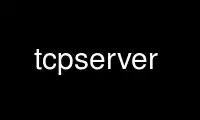
This is the command tcpserver that can be run in the OnWorks free hosting provider using one of our multiple free online workstations such as Ubuntu Online, Fedora Online, Windows online emulator or MAC OS online emulator
PROGRAM:
NAME
tcpserver - accept incoming TCP connections
SYNOPSIS
tcpserver [ -146jpPhHrRoOdDqQv ] [ -climit ] [ -xrules.cdb ] [ -Bbanner ] [ -ggid ] [
-uuid ] [ -bbacklog ] [ -llocalname ] [ -ttimeout ] [ -Iinterface ] host port program [
arg ... ]
DESCRIPTION
tcpserver waits for connections from TCP clients. For each connection, it runs program
with the given arguments, with descriptor 0 reading from the network and descriptor 1
writing to the network.
The server's address is given by host and port. host can be 0, allowing connections from
any host; or a particular IP address, allowing connections only to that address; or a host
name, allowing connections to the first IP address for that host. port may be a numeric
port number or a port name. If port is 0, tcpserver will choose a free port.
tcpserver sets up several environment variables, as described in tcp-environ(5).
tcpserver exits when it receives SIGTERM.
OPTIONS
-climit
Do not handle more than limit simultaneous connections. If there are limit
simultaneous copies of program running, defer acceptance of a new connection until
one copy finishes. limit must be a positive integer. Default: 40.
-xrules.cdb
Follow the rules compiled into rules.cdb by tcprules. These rules may specify
setting environment variables or rejecting connections from bad sources.
tcpserver does not read rules.cdb into memory; you can rerun tcprules to change
tcpserver's behavior on the fly.
-Bbanner
Write banner to the network immediately after each connection is made. tcpserver
writes banner before looking up TCPREMOTEHOST, before looking up TCPREMOTEINFO, and
before checking rules.cdb.
This feature can be used to reduce latency in protocols where the client waits for
a greeting from the server.
-ggid Switch group ID to gid after preparing to receive connections. gid must be a
positive integer.
-uuid Switch user ID to uid after preparing to receive connections. uid must be a
positive integer.
-1 After preparing to receive connections, print the local port number to standard
output.
-4 Fall back to IPv4 sockets. This is necessary for terminally broken systems like
OpenBSD which will not let IPv6 sockets connect to V4-mapped IPv6 addresses.
Please note that this also applies to DNS lookups, so you will have to use an DNS
resolver with an IPv6 address to accept IPv6 connections. Use DNSCACHEIP to set
the DNS resolver IP dynamically.
-6 Force IPv6 mode in UCSPI environment variables, even for IPv4 connections. This
will set $PROTO to TCP6 and put IPv4-mapped IPv6 addresses in TCPLOCALIP and
TCPREMOTEIP.
-Iinterface
Bind to the network interface interface ("eth0" on Linux, for example). This is
only defined and needed for IPv6 link-local addresses.
-bbacklog
Allow up to backlog simultaneous SYN_RECEIVEDs. Default: 20. On some systems,
backlog is silently limited to 5. See listen(2) for more details.
-o Leave IP options alone. If the client is sending packets along an IP source route,
send packets back along the same route.
-O (Default.) Kill IP options. A client can still use source routing to connect and
to send data, but packets will be sent back along the default route.
-d (Default.) Delay sending data for a fraction of a second whenever the remote host
is responding slowly, to make better use of the network.
-D Never delay sending data; enable TCP_NODELAY. This is appropriate for interactive
connections.
-q Quiet. Do not print any messages.
-Q (Default.) Print error messages.
-v Verbose. Print all available messages.
DATA-GATHERING OPTIONS
-p Paranoid. After looking up the remote host name, look up the IP addresses for that
name, and make sure one of them matches TCPREMOTEIP. If none of them do, unset
TCPREMOTEHOST.
-P (Default.) Not paranoid.
-h (Default.) Look up the remote host name and set TCPREMOTEHOST.
-H Do not look up the remote host name.
-llocalname
Do not look up the local host name; use localname for TCPLOCALHOST.
-r (Default.) Attempt to obtain TCPREMOTEINFO from the remote host.
-R Do not attempt to obtain TCPREMOTEINFO from the remote host.
-ttimeout
Give up on the TCPREMOTEINFO connection attempt after timeout seconds. Default: 26.
Use tcpserver online using onworks.net services
